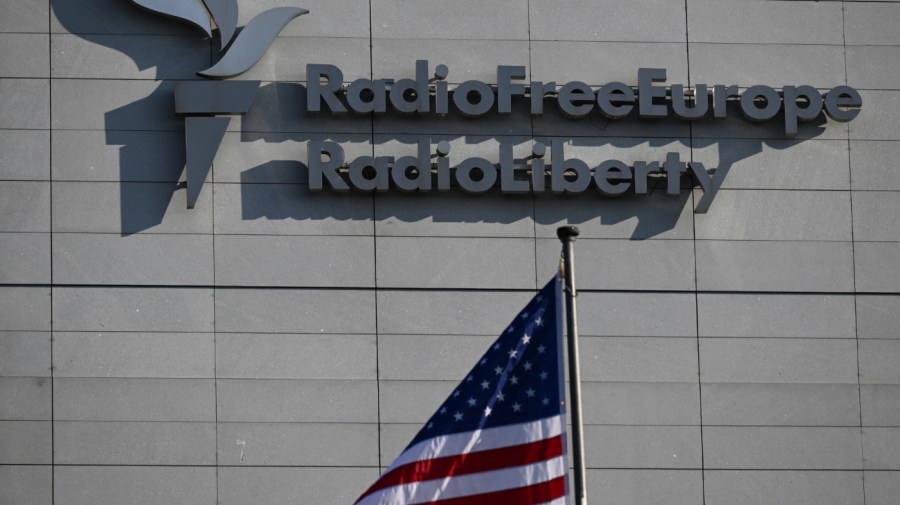The next generation of leaders learn that Radio Free Europe is worth saving

It was an early morning, 12 days and three cities into our summer study abroad, yet my very tired students were at our hostel door, on time and dressed nicely, as warned.
Our group, from a regional state university, had snagged an invitation to the Resilient Europe conference at Prague’s 17th century Czernin Palace.
Once there, the students perked up, dazzled by being in the same room as the Czech minister of foreign affairs and 150 other government and non-governmental experts from the European Union and NATO. They were clearly the only college students in the room.
Later, one student showed me his notes. At the top, he’d written simply “Russia = Bad.” I laughed, but it wasn’t untrue.
One after another, government officials from the Czech Republic, Latvia, Ukraine, Moldova, Lithuania and Estonia described relentless Russian election interference. Russian digital misinformation had provoked a 2021 migrant crisis in Europe, which has only worsened since the Russian invasion of Ukraine a year later.
The point of the conference was for participating democracies to learn strategies from one another, because “the information arena is a crucial battlefield,” one representative said.
Ironically, they announced, the Czech foreign ministry’s email account had become the victim of a cyberattack just the night before, albeit by China.
One of those crucial battlefields in the information arena was our next stop.
We had arranged to visit the headquarters of Radio Free Europe-Radio Liberty across town, which was still open only because of a court challenge to the Trump administration’s decision to take away its congressionally appropriated funding.
Radio Free Europe, which provides uncensored, trusted news to audiences in 23 countries where a free press is nonexistent or under threat, is still at risk even after furloughing staff, reducing programming and letting go of hundreds of freelancers.
Again, my students were awestruck, but for different reasons. First, by the numerous searches and scans to get into the compound housing the news agency. And second, by the reasons for the high security: Trump isn’t the only person who wants to kill it.
Nineteen of its journalists have been killed — five since 2018 — by regimes that do not want their people to have real news. Another three of its journalists remain unjustly imprisoned in Russia, Belarus and Azerbaijan.
Most Americans know little about this historic service because the news it does isn’t aimed at us, though it can be accessed in English on the Radio Free Europe website.
My students were clearly proud that the U.S. government pays for real, independent journalism that reaches 47 million people each week in their own languages.
Some of those people find Radio Free Europe at great risk. In Belarus, for instance, just following or liking something on Radio Free Europe’s social media can land you in prison, we were told. Yet, they don’t have any alternative, truthful source of information.
This means that Radio Free Europe’s Belarussian journalists (now working in Prague) know they can never go back to their home country without being arrested and imprisoned by a president who doesn’t want real news. For doing this job, they might never see their families again.
“Our journalists really feel the mission,” said Jakub Tesar, the fellowships and academic relations officer for Radio Free Europe. “We just always have to make sure the people who work for us understand the risk.”
Yet, under President Trump this spring, the U.S. Agency for Global Media inexplicably disconnected satellites carrying Radio Free Europe to Russia, so its reach there has decreased.
Such decisions have thrilled Russia, where regime officials told The Moscow Times that they were glad to see the service defunded, particularly because it reaches Russians without abiding by state censorship.
The message got through to my students, who called the tour a “privilege.” One later wrote that “a lot of dangerous and powerful people … stand to gain by silencing the truth which these journalists seek out, often causing them to put their lives on the line for their work.”
In summing up her study abroad, she wrote that she’d found a deeper respect for journalism, which is so much under threat.
“I just hope they know that there are people and students (like us) who support the work that they do each and every day,” she wrote. “I couldn’t even imagine cutting funding for an organization that brings unbiased media to places that don’t have it.”
Cindy Elmore, Ph.D., is a professor in the School of Communication at East Carolina University.